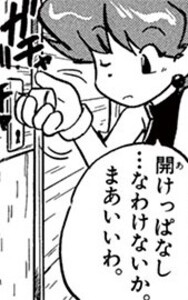Leaving something as-is with 〜っぱなし
Grammar: Condition » 〜っぱなし
っぱなし is appended to a verb stem to show that something has been left in the state or condition from that action, with a negative connotation to leaving it as such.
ぱなし comes from the verb 放す.
Further Reading
- How to use 〜ぱなし (maggiesensei.com)
- Using 「っぱなし」 to leave something the way it is (guidetojapanese.org)
Examples
Leaving a door unlocked with 〜っぱなし

Blue tries to sneak into Masaki’s cottage, but the door is locked.
- ブルー:
- 「開けっぱなし…なわけないか。まあいいわ。」
- “There's no way it'd be left unlocked. Well, that's fine.”
Leaving the futon out with 〜っぱなし

Yotsuba invites her neighbors over for coffee. She first gives the three a tour of the house, leading up to the kitchen.
- 風香:
- 「洗い物がたまってるのが気になる…」
- “It bothers me that these dishes are piled up...”
- あさぎ:
- 「私は廊下のスミにホコリがたまってるのが気になる」
- “What bothers me is the dust built up in the hallway.”
- 恵那:
- 「おふとんだしっぱなしが気になる」
- “It bothers me that the futon is left laying out.”
Leaving toys scattered about with 〜っぱなし
高木さん/preview/からかい上手の(元)高木さん-volume-11-page-34-panel-3.jpg)
Chi’s mother comes into the room.
- お母さん:
- 「おもちゃ散らかりっぱなしだよ。」
- “Your toys are left scattered about.”
The use of っぱなし means that Chi has scattered her toys out earlier, and they are still scattered out. This has a negative connotation, as Chi should have put her toys away after playing with them.